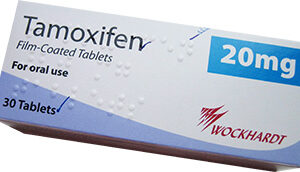Nolvadex, scientifically known as tamoxifen citrate, stands as a cornerstone medication in the comprehensive management of various types of breast cancer. This nonsteroidal antiestrogen plays a pivotal role in hindering the progression of hormone receptor-positive breast cancers, particularly those fueled by estrogen.
Mechanism of Action
Nolvadex functions within the pharmacologic domain by exhibiting both estrogen agonist and antagonist properties. This dual mechanism allows for selective targeting of specific tissue sites. Tamoxifen’s ability to prevent the binding of estrogen to its receptor sites is central to its efficacy in the treatment of breast cancer.
The therapeutic efficacy of Nolvadex revolves around its intricate mechanism of action. By acting as an antagonist to estrogen receptors, it competes with estrogen, preventing its binding to the receptors within breast cells. This competitive inhibition effectively curtails the proliferative signals that estrogen can elicit, thereby impeding the growth and spread of breast cancer cells.
Indications and Usage
Nolvadex is widely prescribed for several purposes within the realm of breast cancer treatment and prevention:
- Primary Treatment: It serves as an integral component in the primary treatment regimen for hormone receptor-positive breast cancer, irrespective of menopausal status. Its inclusion aids in reducing tumor size, preventing metastasis, and improving overall survival rates.
- Adjuvant Therapy: Following primary treatments like surgery, chemotherapy, or radiation, Nolvadex is often continued as an adjuvant therapy. This post-treatment phase aims to prevent cancer recurrence by targeting residual cancer cells and micrometastases.
- Breast Cancer Prevention: In individuals deemed to be at high risk of developing breast cancer, Nolvadex is employed as a preventive measure. Its ability to thwart estrogen’s effects on breast tissue makes it a valuable tool in reducing the incidence of breast malignancies.
- Special Considerations: In male patients, tamoxifen citrate may be utilized to address conditions such as gynecomastia (enlargement of breast tissue) and is under investigation for its potential role in managing male infertility associated with hormonal imbalances.
Dosage and Administration
The dosage of Nolvadex is meticulously tailored based on the specific type and stage of breast cancer, patient characteristics, and response to treatment. Generally, the recommended daily dose falls within the range of 20 to 40 mg, often divided into two doses. However, individualized dosing strategies may vary significantly.
Dosage Table
| Condition | Dosage |
|---|---|
| Hormone Receptor-Positive Breast Cancer | 20-40 mg/day (divided dose) |
| Breast Cancer Prevention | 20 mg/day (may vary) |
| Gynecomastia | Investigational |
| Infertility (Male) | Investigational |
Contraindications and Precautions
While Nolvadex is an invaluable therapeutic tool, it comes with specific contraindications and precautions:
- Contraindications: Individuals with a known hypersensitivity to tamoxifen or its components should refrain from its use. Additionally, patients requiring concurrent anticoagulant therapy or with a history of thromboembolic events should avoid tamoxifen.
- Precautions: Close monitoring is essential for patients with a history of liver disease, ocular disturbances, or uterine malignancies. Regular assessments for potential side effects and therapeutic efficacy are paramount during the course of treatment.
Drug Interactions
Certain drugs may interfere with the therapeutic action of Nolvadex. These include, but are not limited to, anticoagulants, cytotoxic agents, and aromatase inhibitors. Concurrent use with estrogen-containing therapies should be avoided since these may diminish the pharmacological effect of tamoxifen. Additionally, medications that inhibit CYP2D6 may reduce the effectiveness of Nolvadex by interfering with its conversion to active metabolites.
Adverse Reactions
During treatment with Nolvadex, patients may experience a range of adverse effects. Common reactions include hot flashes, vaginal discharge, and menstrual irregularities. Rarer, but potentially more severe side effects could involve thromboembolic events, visual disturbances, and hepatic dysfunction. Any new symptoms or changes in health status should be reported to a healthcare provider immediately.
Nolvadex does not exhibit the potential for abuse or the development of physical dependence. It is not associated with drug-seeking behavior, increased dosage over time, or withdrawal after discontinuation.
Overdosage
In instances of overdose, symptomatic treatment should be initiated. There is no specific antidote for Nolvadex overdose, and due to its high protein binding, dialysis may not be effective. Medical attention should be sought immediately if an overdose is suspected.
Pharmacokinetics
Following oral administration, Nolvadex is absorbed well, and peak serum concentrations occur within four to seven hours. Metabolism of tamoxifen is extensive and occurs mainly in the liver via cytochrome P450 enzymes, leading to several metabolites with a biological activity similar to the parent compound. The elimination of Nolvadex follows first-order kinetics with a half-life of about 5 to 7 days.
Clinical Studies
Evidence supporting the use of Nolvadex in the treatment of breast cancer includes extensive clinical trials. Studies have demonstrated a significant reduction in breast cancer recurrence and mortality rates among patients receiving tamoxifen. Moreover, its preventative efficacy in high-risk individuals has been substantiated through rigorous research.

Kai (verified owner) –
Efficient delivery with professional customer service.